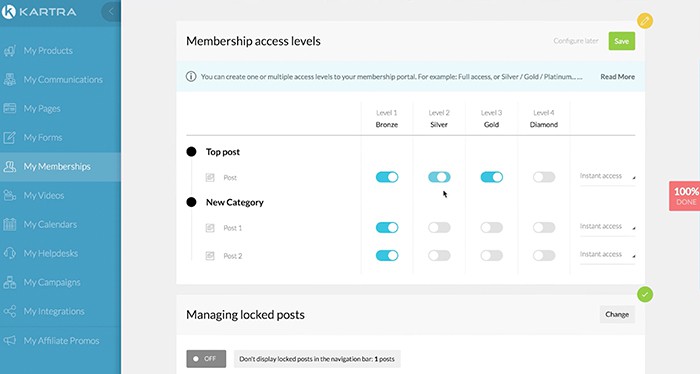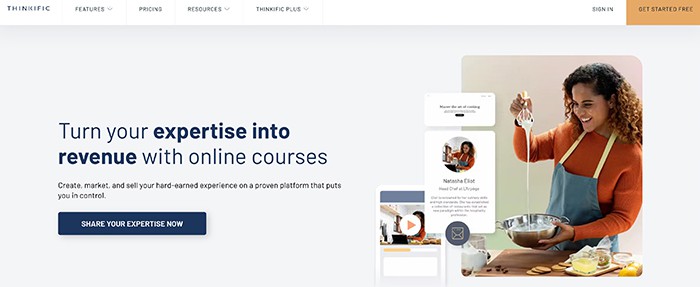Welcome to my best online course platforms review for 2024.
I took the time to research 25 of the best online course platforms out there and rank them according to criteria that actually matter.
So let’s just cut through all the B***S*** and find you a platform that helps you sell online courses and make some of that internet moniez.
This ranking is based on overall online course features, scalability, functionality, and value.
It does NOT consider BS factors like “who is the cheapest and easiest?” I only care about what’s going to help you make the best online courses and actually scale a business.
If you want a platform that builds you a real six-figure business, this is for you. If you want something cheap or simple, go to Udemy.
While you’re at it, click this link to check out my article on how to make no money selling online courses and waste your life getting nowhere.
That was a joke, in case you missed it. But, I do have an article on how to create a $50,000 online course, based on real world experience and exact steps.
Just heed my warning:
Do NOT take this choice lightly. It could be the difference between scaling to six figures and beyond or completely tanking. Ask me how I know.

I rushed into things and chose Teachable. 6 months later, I was sitting on almost no sales, a failing business, and a life of misery I wouldn’t wish on anyone.
Switching to other platforms has been totally life-changing.
So, with that in mind, I’m going to break down the top online course platforms, who they’re best for, my experiences with (or others’ experiences), what they do well, and how they’ll help you achieve whatever your goals happen to be.
Grab a coffee, close Reddit and Facebook, and let’s take a deep dive into Karl’s ranking of the best online course platforms.
First: How Did I Make This Best Online Course Platforms Review?
I took forever to choose the top 5 out of the 25 or so online course platforms.
I drew on my experiences creating and selling online courses. I’m a current Kajabi user and in the past, I’ve used Teachable and Kartra to create online courses. I’ve also had a few cups of coffee with Thinkific and Mighty Networks. Oh, don't forget Podia.
From there, I asked around my entrepreneurial networks like the DC, Investing.io, Authority Hacker, and course creator Facebook groups to get a feel for what folks were using for their online courses.
Everything else is from boots-on-the-ground research, free trials, and gut feeling from all those rando aggregators out there.
I evaluated each platform according to the criteria that actually matter.
In my experience, those are:
- All-in-one features: How many integrations do you need to run a real business? More integrations equal more headaches and more money in fees. It’s a nightmare.
- Overall functionality: What can each separate feature actually do? For example, does the platform offer a real email marketing tool or is it just a tool that sends emails? If you want to sell online courses, running Facebook ads isn’t enough.
- Student experience: What can you offer your students? What will taking your course be like? Most online course platforms have awful UX. None of them made this list.
- Next-level scaling features: How are you getting this beast to six or seven figures? Analytics, funnels, communities, diverse course offerings, upsells—do they even TRY to offer them? Without these features, it’s almost impossible to sell online courses. Your online course platform needs them (or at least needs cheap integrations). If not, it’s a hard pass.
- Usability: You matter too. Is it a nightmare to use the platform or will you actually enjoy the course creation process?
Conversely, I did not put much weight on the criteria that DO NOT matter much (even though people think they do).
Those are:
- Price: Price definitely matters, but not as much as you think. You don’t want to pay more than you have to, but you shouldn’t sacrifice to save money. Sorry, but if you don’t have the money to start a legit business, then either save until you do or go to Udemy and make kiddy pool online courses for $5 a pop.
- Customer support: Customer support matters, but not nearly as much as you think it does. You’re much better off with a ton of helpful features that actually help you sell online courses. Do you know why bad platforms have great support? Because their customers always need to ask someone why things are going wrong.
- Ease of use: Usability is important, but not when it means sacrificing features or student experience. An easy platform isn’t always the best. Teachable is easy to use but I almost quit making courses because it couldn’t do S***. We’re trying to make money here, not make a course as fast as possible.
Best Course Platforms Quick Verdict: My Top 3 Picks

Meet: My Mount Rushmore of online course platforms. The 3 best course tools out there (and Teddy Roosevelt… there really wasn’t a 4th to add, sorry bro).
The truth is, you don’t need to choose from 7 platforms or even 10 platforms. Aside from the top few, they are all pretty much the same.
The vast majority of people reading this need one of the following 3 platforms. Each of them is affordable, offers core key features, and has an excellent student experience.
Here are the top 3 along with their unique selling point (USP):
1. Kartra – The Best Overall Course Platform

USP: The only true all-in-one platform. One subscription covers literally every tool you’ll ever need to sell online courses. Including videos, lessons, marketing, communities, memberships, and customer support.
This is the fastest, easiest route to building a real thriving course business without extra expensive subscriptions.
Pros
- Save tons by never needing another subscription again
- Everything you need under one roof saves time and improves efficiency
Cons
- Extra learning curve
- Limited website builder
Price: Starting from $99/mo
2. Thinkific – The Best Free Online Course Platform
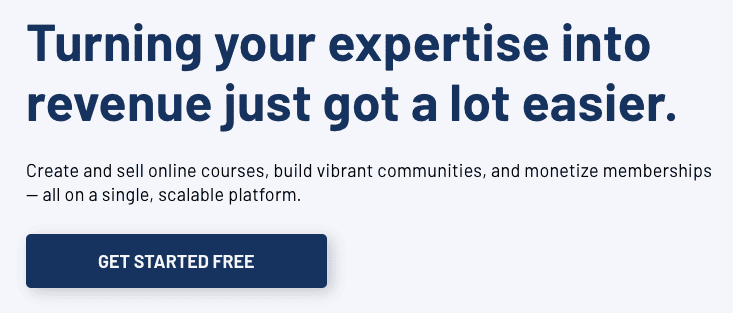
USP: The world’s only legit free online course platform. If you’re unsure about things and just want to test-drive courses until you’re comfortable, you need Thinkific.
You can start and grow courses and communities 100% free with some limitations until you’re ready to take the next step. It’s a great way to get some money coming in first before making a big decision.
You can’t build a thriving business with Thinkific, but it’s a great place to start. And you can always upgrade later.
Pros
- Free to start
- Keep all of your profit (no transaction fees)
- Unlimited courses on paid plans
Cons
- Best features locked behind a paywall
- You’ll eventually hit a hard ceiling due to a lack of high-end features
- Zapier and other integrations create a lot of headaches
Price: Starting from $0/mo
3. Kajabi – The Ultimate Online Course Suite
USP: Kajabi is the course platform all other course platforms wish they were.
Most platforms let you build courses. Kajabi lets you build an empire. Courses, memberships, communities, podcasts, coaching services—everything right down to a mobile app with your face on it.
This is the platform I use now, and I am religious about it. Kajabi ain’t cheap, but it’s where you can build a seven-figure empire.
If your goals are in the millions, Kajabi is for you.
Pros
- Next-level brand building
- The best page and site builder online
- High-end business features like customer relationship management
- Mobile app builder
- Unrivaled analytics
Cons
- Expensive
- You might not need everything yet
- You might need an onboarding call just to get set up
- No unlimited courses
Price: Starting from $149/mo
The 5 Best Online Course Platforms
Let me tell you the truth quickly.
There aren’t 25 amazing course platforms. There aren’t even 10. In reality, there are maybe 7.
I wanted to make life as easy on you as possible, so I chose the only 5 online course platforms that matter. 95% of course platforms are all the same anyway.
Ok, FINALLY. Let’s get to it.
1. Kartra – The Best Overall Online Course Platform for Beginners
Karl’s Thoughts
There is no sane reason you should have to pay hundreds of dollars to get the bare minimum you need to run an online course business.
It’s insane.
That’s why I love Kartra. I recommend it to everyone because it’s the only platform that saves time, saves money, and grows a new course business like greased lightning.
You can try it for $1 and see for yourself.
Kartra lets you start, grow, and manage an online course from one place without any extra subscriptions or tools. You’ll do everything faster, better, and cheaper and eliminate every headache that made me want to quit this entire business.
Best for: Every beginner to intermediate course creator
Not for: 7-figure bosses or influencers looking to build communities
Price: Starting from $99/mo
USP: All-in-one (never pay for integrations or learn a new software again)
Free trial: 14-day $1 trial
Pros:
- Save tons by never needing another subscription again
- Everything you need under one roof saves time and improves efficiency
- Next-level marketing to earn more and grow fast
- Real business features like customer support
- Kartra Marketplace shortcuts scaling by letting you purchase templates, resources, and services from course experts (why do the work if you don’t have to?)
Cons
- Extra learning curve
- Limited website builder
- Unlimited courses only on higher plans
Karl Score: 9.6/10
Kartra Review
Just look at everything you get with Kartra. This all comes in one tool for less than $100 a month:
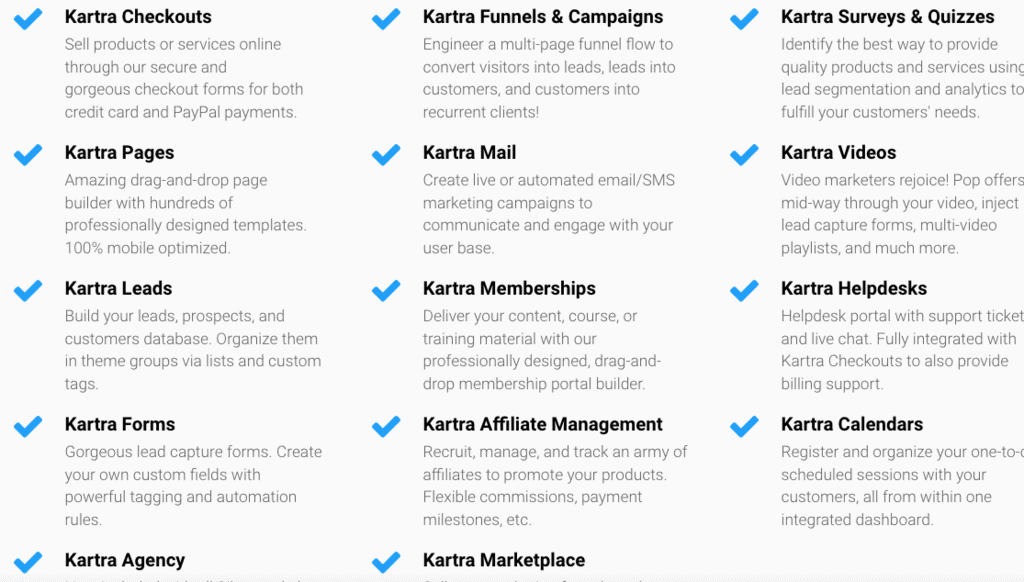
Kartra is definitely the overall best online course platform for one reason: It provides everything you need to start, scale, and manage an online course under one roof for one low price.
Most platforms just let you offer an online course.
Kartra lets you offer a course and then:
- Bring in new leads
- Build entire sales funnels to improve conversions (including webinars)
- Market new products to your existing customers
- Offer customer support directly within the platform
- Boost conversions and average order volumes with upsells and forms
- Hire expert help vetted by Kartra experts
- Improve ROI and decision-making with analytics
- Improve customer relations and boost ROI with advanced customer tagging
- Run a massive marketing agency with Kartra Agency integrations
Normally, you’d need to pay for at least 5 other tools to get this done. That's easily hundreds of dollars a month or more.
With Kartra, it’s all in one place.
No switching between tools, no extra subscriptions, no duct taping your business together, and praying to the course gods for no bugs or crashes—just a simple, efficient business that works.
Using Kartra immediately saves you money by eliminating all of these monthly subscriptions:
- Email marketing ($0 – $100)
- WebinarJam (~$40)
- FreshDesks ($15 – $100+)
- ClickFunnels ($147+)
- WordPress + Domain name (~$100 a year)
Trust, me. My first online course was a nightmare. I needed ConvertKit to send emails, ClickFunnels for new landing pages, a custom site because Teachable sucked, and WebinarJam just to offer SEO webinars to new prospects.
I was constantly switching between tools, entering login information, dealing with notifications, and losing days of business when one went down.
With Kartra, everything is in one place and at most 2-3 clicks away. I felt like I could actually breathe again.
Why I Recommend Kartra
Each Plan Includes Every Feature So You Can Actually Build a Business
No duct tape. No extra tools. No shady subscription plans. No nothing.
Kartra’s lowest-priced plan includes EVERY FEATURE you need to sell online courses. That way, you can actually scale a business.
I hate how some tools advertise an entry-level plan at a cheap price, but hide tons of crucial features in higher-priced plans.
Thinkific, for example, advertises a free plan… but it doesn’t come with key features like affiliate marketing, personal branding, custom domains, or coupons.
It doesn’t even include advanced course-building options.
Basically, what they’re saying is you can start for free, but if you actually want to make money with online courses, you need to upgrade. It just feels shady.
Kartra’s plans include EVERYTHING. Check it out:

That’s 14 online course features for one price. Can’t beat it.
This ensures you’ll never have to upgrade until you’re ready. The only reason to upgrade with Kartra is to get more volume (e.g., more domains, more videos, more team members).
This means you only upgrade once you’re ready. As you grow, Kartra grows with you.
Real Business Building Features (So You Can Actually Scale)
Kartra has a ton of what I call “seven-figure features.”
Instead of just providing online course features, Kartra thinks ahead to the next step and provides features you’ll need to grow a real business.
Eventually, you’ll hit a wall with every other platform besides Kajabi.
This is the difference between 5-figure and six or even seven-figure entrepreneurs. Sure, you might build a great online course, but can you build a thriving business?
Kartra offers what you need without the extra integrations.
Here are my favorites:
- HelpDesks: You’re inevitably going to piss people off. When you do, having helpful customer support there to answer questions will save tons of sales and future business. With Kartra, you don’t need to pay for FreshDesks and Zapier. It’s part of your subscription.
- Sales Funnels: YES. YES. YES. Course creators don’t get this at all. They just sit around and think “where are the customers?” Poking around Facebook groups or just running ads isn’t going to cut it. Kartra boosts sales and conversions by letting you build complete funnels right inside the platform. You can run ads to targeted landing pages, capture those emails with high-converting forms, and even re-market to users on your email list all in one place. And then use Kartra’s analytics to improve decision-making further.
- Customer Relationship Management (CRM): A course business is a business. And just like any other business, you need to organize your leads and market to them properly if you really want to scale. This is how you get to seven figures and beyond. Any leads you get (new students, prospects, or someone from 10 years ago) can be organized with different tags and lists. From there, you can build marketing sequences or even offer discounts directly within Kartra. It’s a game-changer.
Most other online learning platforms let you build a course. Kartra lets you build a legit business. That’s the difference.
Great for Pros and Joes
I hate cliches like this but give me a break.
Kartra is set up so that complete beginners can run an online course business, but advanced users can scale, create custom code, edit templates, and whatever else scratches their evil genius itch.
If you’re new to the game, Kartra can be super simple. Choose page templates, run basic email sequences, and save the advanced features for later.
If you’re a pro, make custom code, create advanced funnels, and run complex email sequences based on custom tagging. Kartra is whatever you need it to be.
What I Don’t Like About Kartra
Lacking Ultra High-End Branding Features
Kartra has everything you need to build a massive course business, but if you’re looking to create a podcast, app, or a massive community around you (aka, a cult of personality), it’s not for you.
That’s why I don’t recommend it for influencers or entrepreneurs with a current following and a huge budget.
That’s the main drawback of these all-in-one platforms. They do everything, but they don’t do any one thing particularly well.
Like, if you have 100,000 followers and a huge budget, then you’ll probably want Kajabi or Mighty Networks. The reason is that you’ve already got what Kartra helps you build.
Get what I mean? You’re better off building a brand around yourself (or your company), including a company pod, app, and online community with events, chats, meet and greets, etc.
If this is you, then:
A) why are you Googling this? And
B) scroll down to the Mighty Networks or Kajabi section.
TL;DR: Kartra is the best overall course platform. It contains every feature you need to scale a real online course business for $99 a month, and it doesn’t hide any key features in higher-priced plans.
Choosing Kartra is the best for growing a successful course because it saves money, simplifies your life, and speeds up the scaling process.
2. Thinkific – The Best Free Course Platform
Karl’s Thoughts
I normally don’t like to recommend cheap online course software that lacks crucial business-building features, but Thinkific breaks the mold here.
Thinkific lets you build a fully functioning online course 100% free and takes 0% in fees.
That’s huge.
With it, you can get used to online course business, validate ideas, and test out the platform. Once you’re ready to take the next step, upgrade and start building.
I recommend Kartra to almost everyone, but if you really aren’t ready and want to take it slow, Thinkific is totally fine. You can always start free now and upgrade when you’re ready.
Best For: Beginners who want to start slow and test out online courses for the first time
Not for: Experts, high-end online courses, or anyone looking to build a serious business long-term
Price: Free – $149 (annual discount)
USP: Build a course 100% free
Free Trial: Free plan
Pros
- Simple without sacrificing user experience
- The next-level course features like quizzes and surveys
- Build communities 100% free
- Start free and pay as you grow
- Unlimited courses on paid plans
Cons
- Best features locked behind a paywall
- You’ll eventually hit a hard ceiling due to a lack of high-end features
- Zapier and other integrations create headaches
Karl Score: 8.9/10
Thinkific Review
Thinkific is the ideal online course software for a few user types:
- Complete beginners who still need to validate their online course ideas
- Beginners on a very tight budget
- Anyone who wants to take it slow and grow gradually without breaking the bank
I really don’t think this is the optimal option, but I understand that everyone is different and has different needs, goals, and budgets, so I’ll bite the bullet here.
It really all comes down to the free plan. Thinkific gives you the following for free:
- An online course
- A community
- Unlimited students
- Chat and email support
And it all comes with 0% transaction fees. That’s the main reason it’s the best online course platform for beginners.
In theory, you could build your online course and start making sales without paying a single dollar for your online teaching platform and zero transaction fees.
That’s amazing considering Teachable charges 5% in fees and $29/month for similar features.
When you’re just starting out, you want to do a “beta release” where you offer a massive discount or even give your course away for free to certain users.
That’ll get you some good feedback, earn you some customer testimonials, and let you learn the ropes of running a business. With Thinkific, you can do that all for free.
Would I do it? No. Is it right for you? Maybe.
If you’re on a budget or still unsure of your online course, Thinkific is great. If you’ve got the money, you 100% need Kartra or Kajabi.
Let me tell you the truth about Thinkific…
Anyone who tells you Thinkific is the best online course platform out there is lying.
Anyone who tells you that you can build a thriving online course business on the cheap with Thinkific is either lying or is an idiot.
Here’s why…
The free plan is missing all of these must-have features:
- Affiliate marketing (you’ll never grow without it)
- A custom domain (customers won’t trust a Thinkific domain)
- Coupons and discounts (you can’t run promos within the platform)
- Membership sites
- Bundles
- Bulk student emailer
- Removing Thinkific branding
You cannot build a legit business with Thinkific unless you pay $99 a month.
Now, keep in mind that even when you pay $99/month, you still won’t get ANY OF THE FOLLOWING:
- CRM
- Email marketing
- Funnel building
- Help desks
- Checkout optimization
It’s insanely hard to sell courses without these features.
Do you see the truth now?
Kartra offers three times more than Thinkific for the same price. Thinkific might look cheap, but you’ll need extra subscriptions to email, funnel, and CRO tools and you may even need a Zapier subscription to integrate them into Thinkific.
Eventually, with Thinkific you’ll be paying more for less.
But that doesn’t mean it isn’t good at what it does. As I said, it’s a great place to start and it’s a great place to grow slowly on the cheap, get used to the business, refine your online course, etc. Do that, then GTFO to something better.
Why I Like Thinkific
Thinkific Has Excellent eCommerce Features For Course Creation Software (Sell More – Think Less)
Thinkific makes selling courses a whole lot easier, and as a lazy person that loves money, that’s right up my alley. The platform has a ton of useful features for boosting course sales, improving conversions, and simplifying complicated eCommerce tasks.
Thinkific uses TCommerce to manage bookkeeping, reporting, and taxation, so that’ll save you hours right off the bat.
It also comes with single-page checkout, order bumps, high-converting templates for sales pages, and other ways to make more sales with higher average orders.
Lastly, using Thinkific lets you appeal to a wider customer base. Customers can pay with PayPal, all major cards, and even Apple Pay. That’s a huge win.
Professional Level Templates
You should’ve seen my first Teachable course page. It looked like Amazon’s first home page in 1995.
Thinkific makes it easy to create your own website fairly easily with its templates and drag-and-drop editor.
Just choose a template (they’ve all been tested for conversions), add in your content, slap on some branding, and you’re pretty much there. It won’t be perfect, but it’ll be dang good, and that’s what matters most.
As far as course platforms go, it’s all very professional looking.
A good course page and checkout page matter when selling online courses. Without them, you’re going to see a major dropoff in purchases. People are turned off by bad web design.
Remember to take this seriously. It’s a real business.
Variety of Course Features
Thinkific has a ton of great features that make it easy to offer fun, engaging, and helpful online courses.
The best are live lessons, communities, and student events. This is key to selling high-ticket courses. If you want to sell $50 courses, just upload whatever you want.
But if you want to make $500+ per course, you need to create a real brand with in-depth lessons and events or you’re going to be way behind the competition.
I really should start doing that…
NOTE: All of these features aren’t available on the free plan. You’ll need to pay at least $99 per month, and maybe even $149.
What I Don’t Like About Thinkific
Look, I’ve said it a hundred times already in this review. It all comes down to two things:
- Thinkific isn’t actually cheap
- Thinkific does way less than its competitors
Thinkific hides crucial features in its expensive plans and then advertises itself as a cheap online course platform.
It just feels shady to me. Sure, you can start for free, but you ain’t growing no successful course without affiliates, advanced lessons, or custom branding.
You need to pay at least $99/mo, just like most other platforms.
And it doesn’t even offer features like REAL email marketing, lead tagging, helpdesks, or funnels. You’ll have to pay for all of that out of pocket.
In reality, you’ll be paying $400+ per month to use Thinkific once you get to that level.
TL;DR: Thinkific is a great online course platform for getting started, and it’s the only legit free platform in the game.
It’s limited, and it’s not the best place to build a business, but it’s great at what it does: Giving you a way to get your feet wet and grow slowly on the cheap.
If you’re totally new to this and don’t want to rush into building a real business, Thinkific is totally fine for your first few stages.
3. Kajabi – The Best Course, Brand, Business, and Community Platform Ever
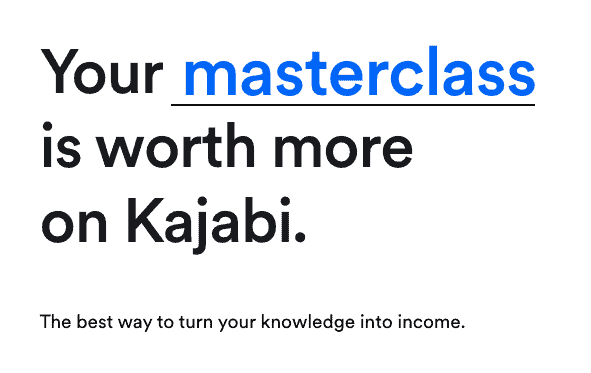
Karl’s Thoughts
In my opinion, there’s Kajabi and there’s everything else.
It’s by far the best course platform, community platform, brand builder, coaching service tool, and learning resource available. This is the software you choose if you want to take over your industry and build a seven-figure brand.
No other platform gives you this much power to learn, create, grow, and manage anything you can possibly think of from a course to coaching packages, podcasts, memberships, communities, and even your own mobile app.
Best for: Boss-level course creators and experts ready to build a massive brand
Not for: Beginners
Price: Starting from $149/mo
USP: The best high-end online course platform for elite course creators and professionals ready to level up from a business to an empire
Free trial: 14-day
Pros
- Next-level brand building
- The best page and site builder
- High-end business features like customer relationship management (CRM)
- Mobile app builder
- Unrivaled analytics
Cons
- Expensive
- You might not need everything yet
- You might need an onboarding call just to get set up
Karl score: 9.8/10
Kajabi Review
Kajabi is an elite platform used by thought leaders, industry experts, and seven-figure brands to start, grow, and manage entire online brand ecosystems. This isn’t for everyday course creators.
Almost every seven-figure course creator I know now uses Kajabi, with a few exceptions. Mostly because they got too big too fast to deal with migrating.
The main difference between Kajabi and other online course platforms is that it just does more. There’s nothing you can’t do course-wise with Kajabi. It’s not even really an online course platform—it’s a brand-building suite of tools.
With just this one tool you can create:
- Courses with audio, video, quizzes, and polls, or multiple courses at once with different themes and layouts
- Mini-courses, drip courses, and membership-only courses
- A podcast to funnel listeners into your email list, communities, or other courses
- A branded mobile app so your course or community is with your users everywhere
- Coaching packages via templates with upsells and cross-sells
- A fully functioning branded websites
- Advanced email sequences with automation usually found only in high-priced email tools
- Vibrant communities with events, chats, and more monetization methods than anyone else
I hate to sound like I’m overselling it. I get that it seems amazing. It really is, but that’s also a downside. It’s really expensive and it’s a B*** to learn.
The reason it’s not #1 is that I don’t think you’re ready for it.
If you’re an influencer, industry expert, or valuable brand with a big budget that’s ready to create a massive ecosystem, then Kajabi is the only option that has everything you need.
If you just want to create a course business, you’re fine with Kartra.
What I Like About Kajabi
It’s the Most Advanced Platform Hands Down
Kajabi just does things other tools aren’t capable of doing. In other words, it empowers you to do things your competition either can’t do or will have to pay out the ass to do.
It’s really night and day compared to everyone else.
Like, with Teachable you can create a course website. With Kajabi, you can build a fully functioning site that’s SEO-optimized and loads fast. Or, with Thinkific, you can enable 1-click upsells.
With Kajabi, you get upsells, cross-sells, downsells, abandoned cart recovery, and advanced analytics to track what’s working and double down.
Here are a few of my favorite luxury features that I use every day:
- Abandoned cart recovery
- Advanced audience segmentation
- Unlimited hosting (no limit to videos)
- Detailed course insights
- Complex email sequences attached to your CRM and analytics
- Course stats and heat maps
Kajabi even offers automations down to the course video level.
Like, if a user completes a video, this triggers an offer that is sent straight to their inbox. It might be for personal coaching or another upsell. It can even just be a “Hey, good job on that video, Steve. I know it was tough. Keep going!” type email.
Kajabi is nuts.
Kajabi Courses Have the Best Student UX
Kajabi enables you to produce the best courses for students with more engaging content and better interaction.
You can offer just about any type of content. Including:
- Audio
- Video
- Live
- Text
- Digital downloads
And that can be drip, subscription, one-time, or a la carte via community events.
I personally love the lesson progress tracking and grading. This lets me offer a more “academy-like” experience that actually functions as a real “school” or training course (and justifies higher prices).
Kajabi Makes It Easy to Scale
I hate GuRu hype talk like RoCkEt FueL, so I’m just going to say it in a boring way.
Kajabi has more features to grow and scale a business than any other course creation tool. I feel like I’m adding rocket fuel to my course (wait, I just did it, didn’t I?).
Their site templates are awesome. You’ll be up and running in a weekend probably.
From there, you’ll have world-class email marketing software with templates for every type of email, a subject line validator, an advanced sequence builder, and analytics.
And normally, funnels are a 4-letter word. But with Kajabi, you can create one from a template, add templated landers, and even run templated email campaigns from a templated sequence. It’s not as easy as point-and-click, but it’s pretty dang close.
One more thing.
Kajabi’s analytics go all the way down to the video level, so you can get into the nitty gritty and optimize your business in ways you can’t with other tools.
For example, you can see audience engagement and drop-off points. Oh, users only watch 63% of video #4? Let me see what’s going on at that exact point.
I discovered that after 5 minutes, my engagement rates went way down in all my videos, so I broke all my long videos into smaller parts and engagement went way up.
Thanks, Kajabi.
What I Don’t Like About Kajabi

I think it’s pretty obvious here. Kajabi isn’t lacking anything and there’s really nothing bad about the tool itself.
The issue is that it’s expensive as hell, and it’s full of features that you might not need. It’s not like Kartra where you pay $99/month and use most of the features right off the bat.
Kajabi will run you $149 minimum. And how long will it be before you need a podcast, branded app, advanced email sequences, and audience segmentation in your CRM?
TL;DR: Kajabi is the absolute best course platform money can buy. If this is your first time and you are unsure of things, Kajabi ain’t for you.
If you’re an industry expert with a big budget and you’re ready to build a massive brand, Kajabi is exactly what you need.
4. SamCart – The Best Course Platform for Fast Sales

Karl’s Thoughts
Want to make some decent courses and sell the S*** out of them? SamCart is a shopping cart software designed to increase sales volume, average order volume, and customer lifetime value.
If you plan to sell cheap or mid-tier courses, it’s perfect.
I’ve used it to sell digital products before like eBooks and consulting packages. It’s a conversion rate optimization life hack. I noticed average order numbers jump immediately.
If you’ve got marketing experience and don’t want all the bells and whistles of Kartra or Kajabi, SamCart is a great way to start making sales immediately.
Best for: Experienced marketers, eCom pros, and course creators/coaches with multiple products to upsell
Not for: High-end courses or creators with just one product
Price: Starting from $59/mo
USP: SamCart is excellent for selling courses. It takes all the proven conversion boosting techniques of massive eCom brands and brings them to the course world
Free Trial: 7-Day
Pros
- Get sales fast
- Boost conversions and lifetime value
- Next-level eCommerce features
- No fluff or unneeded features
- Unlimited courses
Cons
- Not many high-end course features
- Not good for building flagship products or communities
Karl Score: 9.0/10
SamCart Review
SamCart is the industry’s leading shopping cart software, and it’s an absolute beast for selling courses. If you want to hit the ground running and start making sales ASAP, you’ve found your tool.
No other platform has more conversion-boosting features than ole’ Uncle Sam (cart).
I highly recommend SamCart for low-ticket courses, eCom pros, and anyone that plans to add multiple upsells and cross-sells to their products or services.
It’s really like a growth-accelerating tool that instantly boosts sales and overall revenue. The company even claims you can double your sales in a weekend (I take that with more salt than my Sunday brunch margarita, though).
It’s not really a course platform like these other tools. It’s more of a sales-boosting checkout tool that happens to let you build a course (I’ll come back to this).
SamCart was originally designed for eCommerce products and digital downloads like eBooks, so it has a ton of built-in sales hacks that help you sell products faster.
SamCart is ideal for three types of course creators:
- Experienced marketers: If this ain’t your first rodeo, you’ll love SamCart. No bells and whistles. No long onboarding. No fluff. Just upload your videos and let’s make some damn sales. Chances are, you’ve already got ClickFunnels and MailChimp subscriptions, anyway, so the lack of marketing tools won’t hurt you.
- High-volume course creators: SamCart doesn’t have the best course-building or community features, so I don’t recommend it for high-ticket courses ($500+). You just won’t be able to offer the best customer experience. But for lower-ticket courses where experience doesn’t matter as much, SamCart is a beast. You’ll sell more courses and make more profit with upsells.
- Course/coach hybrids: If you’ve got a ton of products and want to upsell and cross-sell, SamCart is perfect. Like, if you want to sell a $200 course AND a $200 coaching call—and then down-sell a $20 eBook (with large fries and a coke!) go sign up for SamCart right now. It’s exactly what you need.
What I Like About SamCart
Selling Made Easy
SamCart is an eCommerce platform designed to sell lots of products, more often, and with higher average order numbers.
Once your course is ready to go, SamCart gets you more sales faster with targeted landing pages, templated funnels, and conversion-boosting features like bumps and bundles.
Everything is super easy to set up, and you can hit the ground running in a day. I wouldn’t be surprised if you made a sale on your first day if you know how to run ads.
Growth Hacking Features
Courses really are a numbers game. More sales mean more profit you can reinvest back into the business with more ads, more content, and more promotional events like webinars.
So, when I see features that can double your average order value, I see growth hacking.
SamCart is a growth hacking machine.
Some of the best features are:
- Subscription recovery: Also known as “dunning.” If someone is late on a payment or their credit card details have expired, SamCart will reach out and threaten violence until they get their act together. Just kidding, they just gently remind them.
- Up-everything: Upsells, upgrades, bumps—SamCart has more “up” features than any other course platform. If you set things up right, you can easily double your average order volume. Imagine you have multiple courses, coaching services, consulting, and digital downloads. SamCart allows you to upsell, bundle, upgrade, down-sell, and package anything together with easy payment and conversion-optimized pop-ups.
- Abandoned cart: SamCart’s abandoned cart recovery is next level, mostly due to multi-step pixel tracking. Now, whenever someone leaves their cart for whatever reason, you have a higher chance of getting them back.
Next-Level eCom Features
SamCart is an eCommerce platform designed to improve sales rather than a course platform, so it’s got better eCom features than something like Kartra or even Kajabi.
SamCart gives you the power to send back custom and complex data to Facebook to help the big evil empire better optimize ad audiences.
For example, if someone buys a $30 product plus an upsell product and a coaching package, you can send the exact amount you made from that sale and Facebook will automatically refine your revenue vs ad spend.
And of course, like any good eCom tool, it also helps with the following:
- Sales tax
- Reporting
- Analytics
- Order management
What I Don’t Like About SamCart
SamCart’s course features just don’t compare to other platforms. As I said before, it’s a checkout cart (read the name) that happens to let you build a course and sell it.
Every other platform here is a course platform that has some sales features. SamCart is the opposite.
That’s why I don’t recommend it for high-ticket courses that should have a community, rich features like progress tracking and grading, and detailed student communication.
You won’t get that here.
But if you’re selling simple mid-tier to cheap-ish courses, you won’t really notice it.
With SamCart, you can offer a basic product and sell the S*** out of it. I just wouldn’t try to make a flagship $1,000 course with it.
Bonus Mention – ThiveCart: The Discount SamCart for Budget Shoppers
We’ve all gone bargain bin shopping at Walmart before. I used to be the king of $3 DVD and RC Cola Saturday nights.
If that’s more your style, ThriveCart does a decent job of looking like SamCart but at a fraction of the price. Instead of $119/mo, it’s $695 FOR LIFE. So, for 6 months of SamCart, you can get a lifetime of ThriveCart.
That’s amazing.
It’s not the best online course platform, but it’s a solid shopping cart with a built-in learning management system for courses.
You’ll get roughly the same sales and marketing features, but there are a few key differences:
- ThiveCart’s interface is wonky: It’s definitely not polished course creation software.
- ThriveCart currently doesn’t offer much for membership sites: You can duct tape one together, but I expect online teaching platforms in 2024 to at least have this built-in feature.
- The sales funnels aren’t really sales funnels: When I first became a course creator, I totally neglected sales funnels for selling courses. Don’t be like me. ThriveCart doesn’t really offer funnels. It’s basically just an upsell offer on your website that they happen to call a sales funnel. It’s not.
So, yeah. It’s definitely not the ideal course creation tool, but if you want to sell courses on the cheap, you can’t argue with $695 for life.
You can make your own website, run an affiliate program, get decent student engagement, and gain access to decent email marketing tools via integrations for super cheap.
If you’re hard up for cash, give it a try.
5. Mighty Networks – The Best Community Builder for Influencers
Karl’s Thoughts
This is what I call the ultimate cult of personality platform.
Mighty Networks is a community builder that I recommend to anyone who’s looking to make a direct connection to students through live events, webinars, chat, and smaller courses.
If you want to offer a course but focus on the community, Mighty Networks is the best way to do it.
Long story short, if you want to connect with your students directly as often as possible, it’s for you. But it’s not a great course platform.
Best for: Influencers and experts looking to build a thriving community
Not for: Beginners or anyone not interested in communities
Price: Starting from $119/mo
USP: Excellent community features like events, groups, chat, and webinars
Free Trial: 14-day
Pros
- Build your own social media network
- The best student interaction features
- More ways to monetize than any other platform
- In-person events, web app, and paid groups made easy
Cons
- No video hosting
- Lacking rich course features
- Expensive to create courses
Karl Score: 8.5/10
Mighty Networks Review
Mighty Networks is what I call a cultural course platform. It’s for building your own social media network around you and your courses. It’s like having a Facebook group that’s on human growth hormones.
It’s the platform influencers and industry experts use to grow a cult following and constantly find new ways to interact, educate, and monetize their skills via events, 1-to-1 consultations, paid groups, and membership sites.
It’s best for anyone who cares more about the community than the course itself.
Actually, Mighty Networks even encourages you to create tons of courses down to the micro level rather than just a flagship masterclass.
By that I mean maybe you have a paid group within your community that needs a specific course.
The community can vote in polls and say “hey Karl, we demand a course on keyword research for 2024 now!” Then, I could create a mini-course and offer it to them at a massive group discount.
With Mighty Networks, you can easily build a thriving cult of personality that 100% believes that you landed on the moon, fought in every war in history, and invented the polio vaccine. You’d do that with:
- Paid and public groups
- Direct student chat
- A social media-like feed
- Private events
- Video chat (“Zoom meeting” type things)
- Membership sites
- Cohort-based courses (I explain below)
- A community bulletin board
Just keep in mind that Mighty Networks is a community platform that lets you create courses. It’s NOT an advanced course platform like Kartra or Kajabi. It also has one major flaw that I personally cannot forgive. I’ll cover that below.
Let’s say some nice things first.
What I Like About Mighty Networks
Everything there is to like about Mighty Networks comes down to one thing: Community.
As I said before, it’s all about building a cult of personality around your brand and monetizing the hell out of it.
Once you grow your audience to that point, there’s nothing stopping you from hitting the six-figure mark or more through courses, coaching, groups, private events, or event series.
Here are just a few of the next-level community features that make Mighty Networks ideal for influencers and high-skilled experts:
- The overall social network feel: Mighty Networks feels like having your own social network dedicated to you. There’s a feed, community board (kind of), groups within the larger group, and chat so you can directly connect with users. I love the constant dopamine hit from chatting with everyone.
- Cohort courses: Cohort courses are when groups within your community take a course at the same time. This provides the “in-person group cooking class” feel that students love. I personally like the idea of putting on boot camps for new students where they all take 1 class each day. It’s a great way to add value, boost your brand, and help more people since cohorts motivate students to do better (competition is key!)
- Virtual events: I’m telling you, I’m going to have KarlCon by 2025. Book it. SEO Happy Hour, virtual conferences, private masterminds, beginner boot camps—Mighty Networks is one of the only platforms I know that makes organizing and holding these events fast and easy. Plus, students can talk to each other, wear attendee flair, or write about their experiences at each event to increase the chances that others sign up and attend. It’s a money machine once you get it going.
- Feeds: Your Mighty Networks community will have its own feed where you can post new articles, ask questions, or just let everyone know what you’re up to (e.g., Karl just broke his all-time 1 rep max bench press). You can even let students or student moderators ask their own questions. Why do all the work when your minions can do it for you?
What I Don’t Like About Mighty Networks
I did the free trial with Mighty Networks and then chose NOT to continue using it and just stick with Kajabi.
It was a tough decision, but in the end, I really needed a flagship course platform with tons of rich features. Mighty Networks is NOT that.
Mighty Networks is for building a community and offering small courses as one small part of that community. Not for creating an expensive course and building a small community around it.
For everything it has in community features, it’s seriously lacking in course features.
A few dealbreakers for me were:
- No hosting: Come on, dude. You can’t even host the videos? What is this, 2012? You’ll need Vimeo at the very least. Mighty Networks even recommends YouTube to host videos. Are you kidding? If I buy an expensive course with YouTube-hosted videos, I’m asking for my money back. The video quality goes way down and you lose so many important metrics. Not to mention, you’ll need to pay for another subscription.
- No good marketing features: Remember, community first and courses a distant 3rd. Mighty Networks really doesn’t care much about the quality of your course or marketing it to the world. The goal is to NOT NEED much marketing since you’ll already have a community ready to buy from you. So don’t expect much from their email or marketing tools. You’ll need integrations for sure.
- Courses are expensive: Mighty Networks’ Basic Plan does not include online courses, so you’ll need to pay $119/mo minimum to even make one. It’s not a big deal if you’ve got a big community, but if you’re just starting out it’s a huge pain in the ass.
The Best Course Creation Software of 2024 – Bonus Mentions
I felt kind of bad leaving some of these course creation tools out of the listing.
To be honest, I just don’t want these companies coming after me with pitchforks and torches. Some of them get pretty flustered if they don’t see their names mentioned with the best online learning platforms.
If you didn’t see your face in any of the learning management systems I mentioned up top, here are a few that might fit the bill.
LearnWorlds
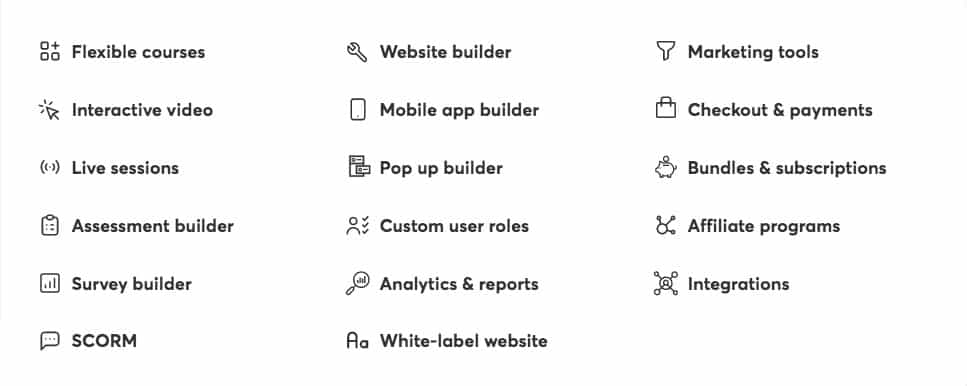
LearnWorlds is actually lowkey a beast course builder with a ton of awesome features to boost course sales. I’ve never used it, but I know a few people who swear by it.
It offers a ton of cool course creation tools like an interactive video and a survey builder.
It also has all the usual suspects for creating courses like a website creation platform, online community features, flexible course content, an affiliate program, and other online school features to help you create and sell online courses.
My issue is that it’s basically the broke man’s version of Mighty Networks, and it’s somehow way more expensive. It costs upwards of $250 a month and doesn’t include email marketing, which comes standard with any learning platform these days.
And as far as online course creation platforms go, it’s pretty dang hard to get the hang of based on user reviews and brief Loom videos I’ve seen of the interface. And no, there’s no free plan.
All in all, it’s a solid platform, but it’s too expensive and lacking some very crucial features.
Podia

Thousands of people around the world who should be using Mighty Networks use Podia to build communities, offer digital downloads, and boost student engagement.
Podia is one of the better online course platforms for coaching, consulting, downloads, and the like, but it’s not as good as Mighty Networks, so I just can’t recommend it.
Like, I’m not going to recommend two of the same type of learning platform if one is clearly better than the other.
Podia does have a killer site builder that lets you build a professional-looking site with 0 web development skills.
Other than that, it’s basically a mirror image of Mighty Networks minus the awesome social media interface and next-level community engagement.
Except for one thing…
Podia has a free plan that comes with “draft courses” and “draft webinars” (aka totally not usable pieces of web flotsam). You know what those are? Little pieces of bate. Little sniffs of the forbidden fruit that get you excited about upgrading.
I just can’t bring myself to recommend it.
Podia’s free plan is bleh for a few reasons:
- 8% transaction fees. Even the Nordic countries would be shocked at fees this high.
- Only draft courses. What’s the point of a free plan if you can’t even sell a course?
- The community is good but features are lacking. You’ll have to upgrade to get the full experience.
- No affiliate program. This is pretty common in the course industry. Platforms give you some cool features to start with but they stop you from growing unless you upgrade. It always irks me since affiliates were such a huge part of my early course success.
Podia’s “Mover” plan is basically the same price as Mighty Networks, but it comes with less and the interface/student experience isn’t nearly as good. Nothing beats Mighty Networks’ social media feel.
Your students will feel at home there, and all of your events, products, downloads, and even you yourself will only be a click away. That equals more engagement, better branding, happier students, and more money for you.
Sorry, Mighty Networks is better.
If you want to try it for free and see for yourself, be my guest.
Systeme.io

Systeme.io is an all-in-one platform that lets you start, build, and grow an online course from the ground up all in one place starting from $0.
Seriously, it does.
You can have a course website with great course content, run marketing campaigns, set up sales pages, use the all-in-one course builder, and accept payments all for free.
You'll live happily ever after eating rainbow sherbet 4 times a day and still having a six-pack.
Sound too good to be true? It’s because it is.
On the surface, Systeme.io looks like a dream come true. An all-in-one platform for creating courses that starts completely free? Oh, and if you really want all-in-one features, just upgrade—the plans are still cheaper than Kartra or Kajabi.
But like delicious hot pockets fresh out of the microwave, the inside holds a dark, fiery secret that could burn you forever.
Systeme.io is great for starting a business, but it’s not great for scaling. You’ll hit the wall VERY quickly and realize that you need a ton of high-end features to grow and manage your business.
And once you get there, you’ll need Zapier to integrate new extensions into the platform (if you even can—some things flat out don’t work with Systeme.io). That means a Zapier subscription PLUS a subscription to another tool.
Systeme.io doesn’t have podcasting, CRM, help desks, advanced tagging, high-converting templates, or advanced email marketing. They claim to have awesome funnel templates, but I have yet to see one.
That’s why I recommend Kartra or Kajabi.
Remember: things are cheap for a reason. You can’t really have cheaper AND better AND easier. Life doesn’t work that way.
With Kartra, you don’t really ever hit a wall. You never need to integrate anything or spend any extra money.
So, yeah, long story short, Systeme.io is a cool all-in-one platform with many awesome features for very cheap, but there’s a reason it comes so cheap.
It’s missing advanced features you absolutely need to grow a business, and adding in all of the necessary integrations adds costs, time, and headaches that just aren’t worth it.
Remember, now is not the time to cheap out. Pony up the extra money for Kartra and do this right from the beginning, please.
Verdict: What Are the Best Online Course Platforms in 2024?
In conclusion, choosing the right online course platform for your personal goals as a course creator could make the difference between a six and seven-figure business or a complete disaster.
I know because Teachable nearly ruined my dreams of becoming a worldwide course-selling celebrity (just kidding, nobody knows me outside of SEO).
So, before I wrap things up here (and before you start creating online courses), you need to get the following ducks in a row.
5 Questions to Answer Before Choosing Your Course Platform
- Do I have the money to do this yet?: I highly recommend NOT cheaping out to save money. You’ll actually cost yourself money in the long run with lost sales and angry students. Yes, Thinkific and ThriveCart are cheap ways to get started, but you should use them with the goal of scaling quickly and not sitting still on some free or $20/month plan. Be prepared to pay around $100/month within the first 3 months. Stop complaining.
- Do I want to sell high, mid, or low-ticket courses?: Selling $50 courses is way easier than selling $1,000 flagship masterclasses. You’ll need nicer features and a big community to justify that asking price. If you want to sell high-ticket products, get an all-in-one platform like Kajabi or Kartra. If you want low, churn, and burn-style courses, get an eCom platform that can sell cheap courses fast.
- Are my courses just there to upsell other products?: I know plenty of people selling $50 courses just to upsell $500/hour consulting or $1,000 coaching programs. If your courses are just a low-ticket stepping stone to something else, you don’t really need a command center like Kajabi.
- Do I care more about courses or the community?: Where’s your bread going to get buttered? Do you want to eat off $500 courses or do you plan to use the course as a gateway to your community? If it’s the former, get Kajabi. If it’s the latter, you probably need Thinkific or Mighty Networks. If you want just the community and want to sell small courses within it, you need Mighty Networks.
- What level are my marketing skills?: It sounds counterintuitive at first, but hear me out. The better you are at online marketing, the lower your need for simple, all-in-one platforms like Kartra. Kartra makes it easy for anyone to make basic funnels, run email campaigns, and all that jazz. But if you’re already an advanced marketer, then you probably don’t even need those tools. You can just use whichever subscriptions you have already or jump in head first and build your own funnels on ClickFunnels or LeadPages.
**DEEP BREATH**
OK, now that we’ve got that out of the way, let me sum up the best online course platforms of 2023.
The Best Online Learning Platforms TL;DR
- Get Kartra if… you’re a beginner who wants the easiest, fastest, and most affordable way to scale a course business. You’ll never need another tool and your life will be so much easier.
- Get Thinkific if… you’re absolutely on a budget and want to test out online courses for free before upgrading.
- Get Kajabi if… you’re an advanced course creator or an industry expert who wants to build a massive brand with a podcast, app, community, memberships, and more.
- Get SamCart (or ThriveCart!) if… you’re an advanced marketer or low/mid-ticket course creator who wants to sell courses fast with the best eCommerce features
- Get Mighty Networks if… you’re an influencer who cares more about building a massive interactive community with online courses as just one small part of an online cult of personality
Still with me? Online course platforms are a dime a dozen. Trust me, I just wasted an entire weekend pouring over them.
The best online course platform really depends on your needs and goals (actually, it’s Kajabi… but that’s neither here nor there).
I hope you sell a ton of online courses and think of me every time you get that email notification: “(name) just purchased your course for ($$$)”!
Good luck, and let me know which online course platform you choose. I hope it’s Kartra or Kajabi.
Good luck!
The Best Online Course Platforms F.A.Q.
Q: What is the best online course platform?
A: The best online course platform for most course creators is Kartra. It has all the tools you need to create and sell online courses under one roof including creating course content, running a structured course curriculum, email marketing tools, creating your own affiliate program, a website builder with a custom domain, and templates for course landing pages. It’s one of the best management systems for an online school I’ve ever used and everything you need to create and sell online courses comes for less than $100.
Q: How do I create an online course?
A: You create an online course by determining which subject you have expertise in that students are also willing to pay for. From there, you need to choose a learning platform and begin to structure your course materials. You want to start with the main idea and build it from the ground up. For example, if it’s copywriting, then you want to include every key concept someone needs to know to become a good copywriter. I highly suggest breaking each of your videos down to less than 5 minutes within your course builder and making everything as digestible as possible. And of course, you also have to choose the best online course creation software!
Q: What is the best free online course builder?
A: The best free online course builder is definitely Thinkific. It has a totally free plan that offers a ton of key features like the ability to build an online course website, some key sales and marketing tools, a fully functioning learning platform, the ability to create an online community, and templates for landing pages. This is all available on the free plan with zero transaction fees.
Q: What are the best online course platforms with a certificate?
A: The best online course platforms with a certificate are definitely Kajabi and Kartra. Both of these online platforms not only let you create online courses but also let you offer certificates of completion within the online course platform. When you start to create courses, you want your students to be able to show potential employers that they’ve learned skills at your online school. I highly recommend putting this feature on all of your sales pages. Make sure your online course platform offers this. If it doesn’t, choose a different learning management system.
Q: Which online course platforms are actually legit?
A: Legit online course platforms include Kartra, Kajabi, Thinkific, and Mighty Networks. Other legit options include eCommerce shopping cats that also offer course creation features like SamCart and ThriveCart. I’ve never come across course creation that’s an outright scam. The only issue is that some course creation software is missing key marketing tools or bill themselves as all-in-one platforms when they really aren’t. The only online course software that I do not recommend is Teachable. Its marketing tools are very low quality, its sales pages look outdated, and the learning management system is very basic. It lets you create courses, but that’s about it. As far as learning management systems go, it’s at the bottom.

